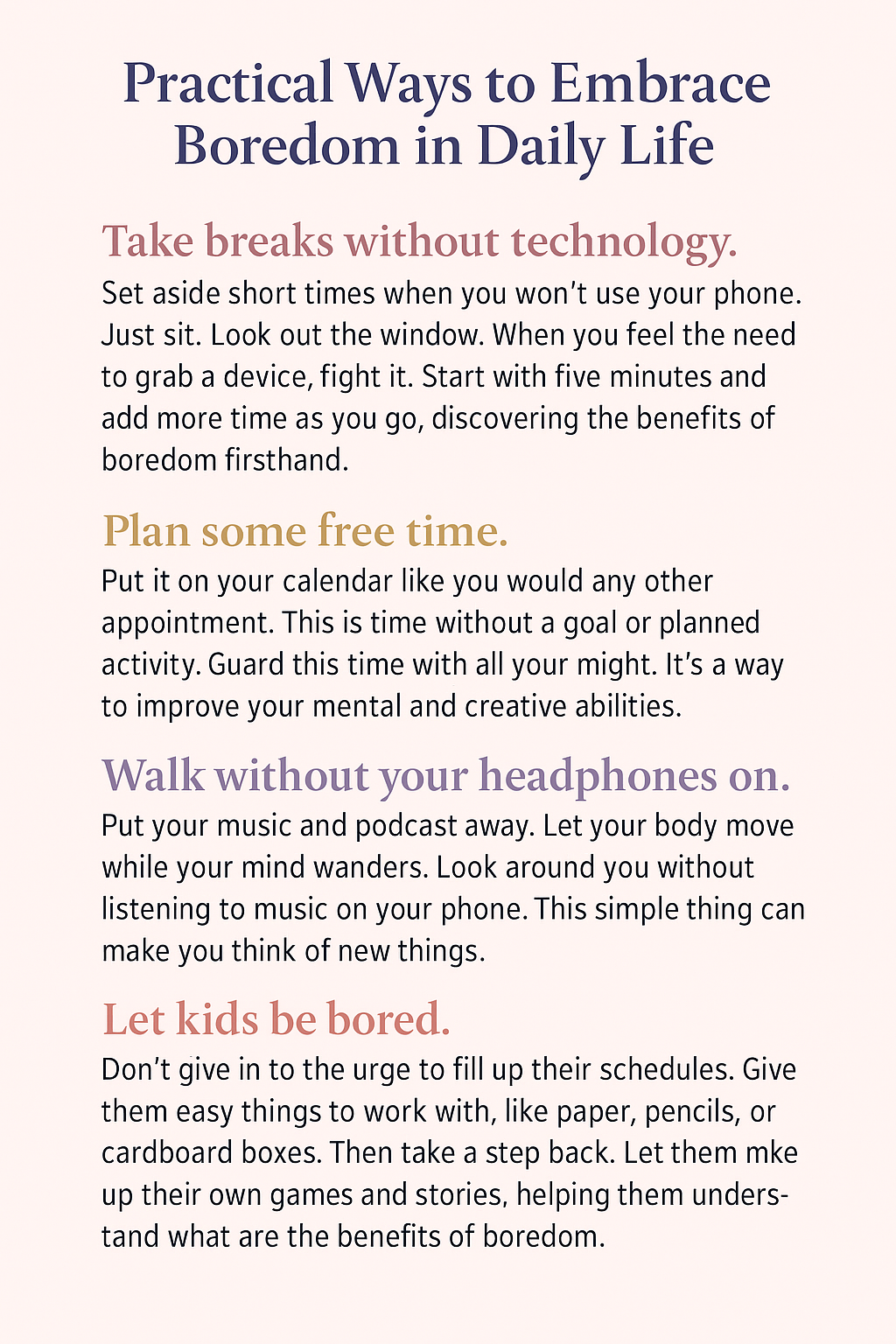The Surprising Benefits of Boredom for Your Mind and Life

Sarah Johnson, MD

You can feel it in your body. An ache that won't go away. A desire for something to do. Boredom is often seen as a bad feeling in our fast-paced, always-online world. Yet science shows the benefits of boredom can include better mental health, creativity, and focus. We often act like it's a system error to fix, rarely pausing to ask what are the benefits of boredom — and why this simple state might actually improve your life. We grab our phones to turn it off right away.
But what if you didn't? What if being bored isn't a problem to solve, but a secret gift waiting to be opened? This isn't about making laziness look good. It's about getting to know a misunderstood state. This article explores the surprising value of boredom and how it can boost your creativity, well-being, and daily clarity—offering a science-backed answer to why boredom matters.
That restless feeling can be a signal to pause, not panic. If it becomes overwhelming, exploring it with a Mental Health AI can offer clarity.
better with Soula

Support for every woman:
✅ A Personalized Plan to reduce anxiety and overthinking
✅ 24/7 Emotional Support whenever you need it Cycle-Aligned Mental Health Tracking — monitor your mood and symptoms in sync with your period
✅ Real-Time Insights into your energy levels and emotional state
✅ Bite-Sized Exercises to help you return to a calm, balanced state — anytime, anywhere
What Is Boredom, Really?
Boredom is a sign. Your mind is telling you that you aren't really involved. You feel like what you're doing right now isn't important. Your brain needs a challenge and a reason to live. What matters is that it is looking for stimulation, which is one of the key benefits of boredom.
Its forms are very different from each other. Chronic, widespread boredom can be bad for you. It could mean that you're not happy with something else. Boredom that is healthy and only lasts for a short time is different. It's a short period of time when you don't care. This is the kind that has promise and makes people ask, what are the benefits of boredom? Interestingly, emotional flatness from long-term boredom can resemble languishing — the state between well-being and burnout.
This feeling makes us want to do something. That feeling of unease is what drives you. It's an internal push to make things better. It makes you want to find something new and better. That feeling of restlessness is very important. It is the engine of change.
What Are the Benefits of Boredom?
Why Is Boredom Important for Mental Health?
Healthy boredom acts as a natural pause for your nervous system. It lowers overstimulation, supports emotional balance, and restores focus — a key mental benefit of boredom in a busy world.
What Are the Positive Effects of Being Bored?
When you stop chasing constant stimulation, your brain resets. This simple act leads to more creative thinking, problem-solving, and deeper self-awareness — the positive effects of boredom that help long-term well-being.
Feeling bored can unlock your creativity, making it one of the most underrated mental health advantages of doing nothing. Your inner world comes to life when outside input stops. When you're not distracted, your brain can roam and make new connections between ideas. This is how new ideas start. It lets creativity run wild without limits — much like the reflective stillness described in reading for mental health, where mindful pauses help ideas take shape.
It actively pushes people to solve problems. That feeling of restlessness makes you want to take on new challenges. It makes you come up with answers. You come up with new ideas for projects or ways to do things. Boredom is the uncomfortable feeling that comes before a breakthrough.
It supports emotional balance and mental clarity—both of which are essential for brain health and resilience. Our nervous systems are constantly overstimulated. Boredom provides a crucial psychological rest—helping you decompress and reset mentally. Downtime is what helps calm down overstimulation. This helps your brain get back to normal after all the digital noise.
It gives you time to think about yourself. You can hear your own thoughts when it's quiet. You can think about your personal goals, values, and direction. Being busy often makes this clarity hard to hear. When you're bored, you have a blank page to write on.
It helps kids become stronger. A child who has to keep themselves busy learns to be independent. They learn how to be resourceful and creative. If you fill every moment for them, they won't learn this important skill. Boredom teaches kids how to self-regulate, think independently, and cope with emotional discomfort—essential lifelong skills often lost in overstimulated environments.
Why Neuroscience Says Boredom Is Good for the Brain
Neuroscience points to the Default Mode Network (DMN). When you're not focused on something, this brain network turns on. It turns on when you daydream or rest quietly. The DMN is important for more complex brain functions. It's where you put all your memories together, contributing to the cognitive benefits of boredom.
You can also figure out what your experiences mean here. The DMN helps you think about the future and get to know other people. It is very important for creative thinking and thinking about oneself. You can only use this network when you're not busy. It turns on when you're bored.
The brain gets tired from constant stimulation. It keeps the DMN from working. Scrolling and switching all the time drains your mental resources. In this sense, boredom acts like a natural dopamine fast — giving your mind a chance to reset and restore balance. Boredom, in contrast, allows the brain to recharge, supporting cognitive recovery and emotional regulation.
These findings highlight the importance of boredom as a mental rest state. One of the greatest advantages of being bored is that it restores focus and creativity — showing why boredom is good for you both emotionally and cognitively.
Practical Ways to Embrace Boredom in Daily Life

Not all boredom is the same. Some forms are fertile ground for reflection and insight, while others may drain your energy and signal a deeper issue. The table below compares productive versus passive boredom, helping you identify which type you’re experiencing.
| Type of Boredom | Description | Psychological Effects | Potential Benefits |
|---|---|---|---|
| Productive Boredom | A temporary pause in stimulation that invites reflection or curiosity. | Improved mental clarity, emotional resilience, and creativity. | Encourages problem-solving, idea generation, and cognitive reset. |
| Passive Boredom | A state of disengagement without direction or intention. | Emotional numbness, irritability, and lowered motivation. | Signals a need for change or deeper self-awareness. |
Examples of Boredom Leading to Breakthroughs
Boredom and Creativity: Why Doing Nothing Sparks Ideas
Periods of quiet boredom help the brain link unrelated thoughts, a process known as creative incubation. It’s one of the hidden benefits of being bored.
Boredom and Brain Health
Regular mental rest prevents overstimulation and supports long-term cognitive resilience — an often overlooked benefit of boredom for brain health.
Scientists and inventors often came up with their best ideas when they weren't working. In the bath, Archimedes had his "Eureka!" moment. Isaac Newton came up with his ideas while he was staying at a quiet farm, demonstrating the profound benefits of boredom.
These times are important for writers and artists. J.K. Rowling thought of Harry Potter while she was waiting for a train. She only had her thoughts and a napkin to write on. Boredom created a blank canvas for a new world to grow.
You go through this every day. The best ideas come to you when you're taking a shower or washing the dishes. These everyday tasks leave a gap in your mind. They let your subconscious work on problems, perfectly illustrating what are the benefits of boredom for creative problem-solving. When you "do nothing," solutions come to you.
When Boredom Might Be a Warning Sign
Boredom that is good for you is short-lived and useful. It is a temporary state that gets you involved, highlighting one of the key benefits of boredom. If your boredom is constant and empty, pay attention. This could be a sign of something more serious.
Depression can be linked to being bored all the time. It could mean that you are losing interest or pleasure in general. It could also mean that you're always unhappy with your job or life, making it important to understand what are the benefits of boredom versus when it signals a deeper issue. In some cases, emotional numbness or irritability may even trigger narcissistic rage or frustration in relationships — another way boredom reveals deeper unmet needs.
Pay attention to what it says. If nothing you do feels important, it might be time to figure out why. If you keep feeling this way, talk to a mental health professional. They can help you tell the difference between a passing mood and a bigger problem.
FAQ — Benefits of Boredom
What are the main benefits of boredom?
Boredom helps people be more creative, solve problems, and relax their minds. It gives time for self-reflection and helps build emotional strength, especially in children who learn independence through quiet moments.
Can boredom really improve creativity?
Yes. Neuroscientific studies show that boredom activates the brain's Default Mode Network — the system responsible for imagination and creative insight. This state helps your mind process information, form memories, and spark innovative thinking, making boredom essential for mental renewal.
Why is boredom good for children?
It teaches them to take care of themselves and think creatively. Kids learn independence and problem-solving when they have to create their own fun, developing lifelong emotional resilience and adaptability.
How do I use boredom in a healthy way?
Make room for it on purpose. Take breaks from technology, plan unstructured time, and let your mind wander without rushing to fill the silence. Intentional boredom helps your brain rest and recharge naturally.
Is boredom ever harmful?
Chronic or empty boredom may signal emotional fatigue or depression. If it happens often and makes you feel disconnected or sad, it’s important to explore possible causes with a mental health professional.
Why is boredom good for your brain?
Boredom activates areas linked to imagination and memory, allowing new neural connections to form. It’s one of the main cognitive benefits of boredom proven by neuroscience, supporting creativity and emotional regulation.
How can boredom improve focus and motivation?
When stimulation drops, your brain resets dopamine levels, helping restore concentration and drive. This reset is why experts say boredom can increase motivation and productivity over time.
How does boredom benefit emotional well-being?
Boredom provides emotional breathing room. It helps calm the nervous system, lowers anxiety, and increases self-awareness by giving you time to process feelings instead of reacting to constant stimulation.
Why is boredom important for adults?
For adults, boredom acts like mindfulness in disguise. It encourages reflection, resets mental energy, and helps balance an overstimulated lifestyle — showing that quiet, unstructured time is essential for long-term emotional health.














